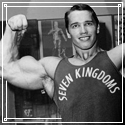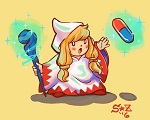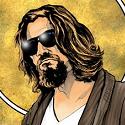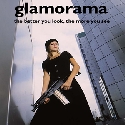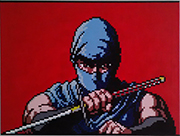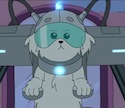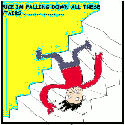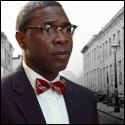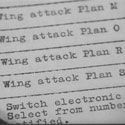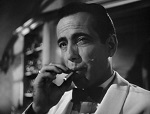|
Last week I read Redshirts: A Novel with Three Codas by John Scalzi. I finished it in one very lazy workday. It was a good page-turner right up until the codas, where things just got too meta to be enjoyable. I appreciate the weight that it adds to the book, but at the same time I really don't give a poo poo about reading blog entries. Last week, I also bought Ready Player One by Ernest Cline and finished it today. I burned through it in about as much time as Redshirts. I found myself enjoying all the little references to the eighties more than I thought I would, but there were chunks of book that were just embarrassing. The romantic chatlogs and the Japanese characters in particular sent shivers down my back. All in all I found both books pretty middling, but I'm happy to be reading again. Now that I've gotten the engine revving with those two pieces of coal, I'm hoping to move onto something a bit more substantial.
|
|
|
|

|
| # ? May 14, 2024 21:27 |
|
Yesterday I finished Outer Dark by Cormac McCarthy. As always, I appreciate his writing style, but on the whole this book felt a little less engaging than some of his other novels. Still some pretty good stuff, though.
|
|
|
|
Just blew through The Reapers Are The Angels by Alden Bell, and it was fantastic. It was like William Faulkner wrote a zombie apocalypse. The cover looks like a YA novel, but it was anything but...
|
|
|
|
Been reading a fantastic book called The Major Works from Oxford World Press. It's a collection of Robert Browning. It's got most of his famous books of poetry complete as originally published (Pippa Passes, Bells & Pomegranates, Dramatic Lyrics, Men & Women, etc.), three lengthy sections from his magnum opus The Ring & the Book, some samples of his later, lesser work, & a lengthy section of his correspondence, including, of course, a hefty bit of his letters to Liz Barrett Browning. It's an amazing book that I highly recommend. Some of the poems are just so exquisite that I had to get all deep and just go ahead and right a frigging essay about some of them. But, if Browning is one of the "classic" poets that you just never got into, do so and start with this huge book. I'd never read much Browning until I started this one, but he's one of the icons that actually deserves his status. For your edification, an essay on one poem; not to be used as a substitute for actually reading the poem. Abt Vogler (1997) – Robert Browning, Adam Roberts  Therefore to whom turn I but to thee, the ineffable Name? Builder and maker, thou, of houses not made with hands! What, have fear of change from thee who art ever the same? Doubt that thy power can fill the heart that thy power expands? There shall never be one lost good! What was, shall live as before; The evil is null, is nought, is silence implying sound; What was good shall be good, with, for evil, so much good more; On the earth the broken arcs; in the heaven, a perfect round All we have willed or hoped or dreamed of good shall exist; Not its semblance, but itself; After Browning’s amazing, though not particularly popular Men & Women in 1855, Browning married Elizabeth Barrett and took a lengthy hiatus. It was not until after his wife’s death, that Browning published again, but when he did so, it was with a volume that didn’t pale compared to his earlier works in the least. The 1864 publication of Dramatic Lyrics was, to that point, Browning’s most popular book, requiring a second printing, a first for the ridiculously overlooked poet. Not least among the poems in Dramatics Lyrics, though not most either, is Abt Vogler, a meditation on coming to terms with loss and diminishment, not that Browning himself needed to worry about any such thing just yet. Abt Vogler is written in the voice of an actual historic personage, as are many of Browning’s dramatic monologues. Vogler was a composer and musical innovator; in this poem, Browning imagines him aged, growing more infirm, meditating on the purpose and value of his life. This poem lies directly before a poem that is, I think, slightly more famous in Browning’s body of work, Rabbi Ben Ezra. In both of these luminous poems, Browning reflects on finding peace in old age, a comfort in what has been accomplished and a trust in God for the future, both in this world and out of it. The two poems make wonderful companion pieces, both being suffused with the kind of optimism that might seem maudlin, or even senile, if someone less talented than Browning tried to express it. Vogler realizes that many of his musical achievements will not outlive him and even those that do will not be enough to assure that he is remembered. Vogler is right about this; an aficionado of classical music, I was still introduced to Vogler through Browning and he is rarely mentioned in any other context outside of very small circles. Vogler is also not so blind as to believe that he’s achieved any kind of perfection in his work or in his life. He sees his grand achievement as still “broken arcs.” He sees himself as a man who has been able to bring his grand inspiration into actual being only sporadically and only up to a point. His work has never quite been the triumph in this world that it has been in his mind and in his soul. There isn’t a creative person in the universe who will fail to understand this, save perhaps Browning’s version of Andrea del Sarto, who feels himself to have achieved a kind of perfection at least. But it’s the curse of all other artists to forever be striving for an ideal that cannot quite be reached. Vogler is no del Sarto; he has done many things of which he is proud, but he isn’t arguing for his canonization. Yet, even with this pragmatic and clear-eyed perspective, Vogler is able to find peace and comfort in the life he has lived. He has done what he could, as Christ said of the woman with the alabaster box. He has believed in good and in God and he believes in them still, even as his talents begin to atrophy with age, even as death approaches. The poem is gifted with two astoundingly moving passages in particular. In the first, Vogler returns to his faith in God and his steadfast belief that God will ultimately be just, that the ultimate fate of the universe will be, in God’s hands, for good. Vogler unabashedly looks for a new life after this old one has passed away in a heaven where all goods that were only partial on this earth will be finally completed. The second is the closing stanza of the poem. In it, Vogler takes himself through several chord changes in his mind, reflecting on the art of music and the technique of it too. He closes with one of the most satisfying resolutions in the history of poetry, stating that, as in his music he has brought every piece he has composed to its necessary resolution, so too he brings himself and his life. He closes, he says, resting in the “C Major of this life.” Any musician will understand the power of that central chord, that central resting place in music. It’s a thought so beautiful that it seems strange that it hadn’t already been expressed. No one can deny the absolute power of the resolving chord, not even in this post-rock era, when songs often meander away into electronic dissonance or simply fade out in progress. We love those songs, sure, but there’s something undeniably, absolutely perfect about that rock solid chord that resolves a piece of music. It’s a place we all understand intuitively and a feeling no other chord but the proper one can deliver. Pray God this, like Abt Vogler, like Rob Browning, that all our themes end there. 4 ˝ out of 5 stars.
|
|
|
|
I read a short piece of genre trash. HELL TRAIN, by Christopher Fowler. It was good, though I felt the third level of narrative was utterly unwarranted and made the whole book into an awkward fanfic.
|
|
|
|
Sir Francis Drake by John Sugden. I actually started this a while ago, but put it down when I realized that Drake's puritanism and hatred of catholicism would be a central motivating factor in his adventures—so I read MacCulloch's The Reformation in the meantime, to get a feel for the religious controversies and atmosphere of the day. Drake emerges from this book as a intensely pious adventurer with a love of plunder. I'm not sure any one person could have a more diverse set of mixed motives. I knew something about Drake's voyages before reading this book, but come away even more impressed by his courage, his eye for fortunate circumstances, and his unbelievable luck. Books like this make me want to read more biographies, but then I realize that few people have ever had a life 1/10th as interesting as Drake. Don't let the ruffle collar fool you, this man was a badass.
|
|
|
|
Just finished Murder on the Orient Express, by Agatha Christie. In the end, I suppose all my theories about who the murderer was were, by some stretch of semantics, correct, but I didn't stumble upon the idea that everyone was in on it together until Poirot had already started his final explanation. Overall I was less fond of this one than I was of And Then There Were None. It felt static - after the murder was committed, there wasn't really anything to raise tension for the rest of the book. Poirot was free to kick back and take his time in solving the case. And Then There Were None had the stakes and tension constantly being escalated as more people died. Also, I know this is probably a byproduct of the time it was written, but it really did feel like it was a story about a group of ethnic stereotypes on a train. 4 out of 5 stars. Next, at the suggestion of a friend, is The Murder of Roger Ackroyd. Quinn2win fucked around with this message at 23:57 on Sep 11, 2012 |
|
|
|
I have recently finished reading the Shadowdance Trilogy (A Dance of Cloaks, A Dance of Blades, A Dance of Death) by David Dalglish. Overall I've enjoyed reading these books. The only thing I'm not too fond of the way the author chose to reveal the world: he chose to do it piece by piece, introducing something only to leave me thinking "Well that was convenient."
|
|
|
|
ProfessorProf posted:Just finished Murder on the Orient Express, by Agatha Christie. In the end, I suppose all my theories about who the murderer was were, by some stretch of semantics, correct, but I didn't stumble upon the idea that everyone was in on it together until Poirot had already started his final explanation. I tend to think And Then There Were None is Christie's best book. It's one of her most philosophical and nihilistic and suspenseful. You should get into the Miss Marple books too though. The thing I love about some of the Marple novels is that Miss Marple is generally only a supporting character. In the best Marple novel, The Moving Finger, she appears in two scenes, I think, prior to the conclusion. I'd recommend The Body in the Library, which has a classic Christie headfake twist. And, like I say, The Moving Finger, which is very short and very dark. And, man, talk about misdirection.
|
|
|
|
Just finished Outlander by Diana Galbadon. It was probably one of the worse books I've trudged through in a long time. The plot had no goal, the characters were flat, and the "romance" part of the book sounds like it was written by a high schooler. I don't understand how this series is so popular.
|
|
|
|
Finished Raven's Shadow Book One: Blood Song by Anthony Ryan (reading in bed till 3am as I couldn't put it down). A really nice fantasy book about a holy warrior and his friends, in a world full of schemes. Revealed bit by bit as the protagonist tells his story to a historian. It really felt like there was always something happening to advance the plot and let me know more about what's really going on. Thanks to whoever mentioned this book on these forums, looking forward to the next book in the series.
|
|
|
|
 Just recently finished it - I found it a bunch of fun, and it kept me up late all 3 nights I read it. Present-day, urban sci-fi/fantasy... If you like either the fantasy or sci-fi genres, I recommend giving this a read. It has elements of both, and there are few To anybody considering reading it, I suggest going in with little to no knowledge of the book - don't read blurbs/reviews first, just read it!
|
|
|
|
The Second Crusade: Extending the Frontiers of Christendom by Jonathan Phillips. I was unsatisfied with the account of the crusades in Tyerman's God's War so I picked up some other books about individual crusades that hopefully are more committed to a pleasing narrative style. This book emphasizes the broad aims of the 2nd crusade, which not only featured a (failed) mission to Jerusalem, but a (mildly-successful) effort to get rid of the Wendish heathens in northern Europe and a (successful) mission in the Iberian peninsula. These people were fueled by the memory of the first crusade, whose success depended ultimately on the unprepared and deeply divided Muslim forces in the middle east. The Muslims were not caught napping and squabbling this time (and never would be again) and the western European crusaders (known universally as Franks) would find every successive crusade more difficult and less productive. At the time of the 2nd crusade, however, it wasn't really understood how tough it was going to be, and the ultimate failure of the enterprise was a deep shock to the self image of Christendom. It wouldn't be the last time.
|
|
|
|
Just finished reading Ira levin's The Stepford Wives and am now starting Rosemary's Baby. Wish I hadn't waited so long to pick up some of his work, he has a great distinct flow to his writing and gets so much across in very few words. Just loving it.
|
|
|
|
Just finished Infinite Jest, lots of fun(almost satirical) characters and the interesting plot of "The Entertainment" which upon viewing it renders the person lifeless. The writing, narration and timeline are all off putting. Narration really was hard to get a grip on, sometimes it was the characters active during the moment and then the next chapter ends up being blocks of description about a certain trend in the not-so-far-future world. Also David Foster Wallace said he wanted the book to read as something in real life was unfolding, this holds true. Though whether this ends up being a positive or negative thing is hard to say. The characters will go at length to describe the most trivial details. World characterization and character development happens out of nowhere. Other annoying thing is the non chronological timeline, which I hate and you probably won't know when, where or what is actually going on until a hundred pages later. There is this thing going on this book, where characters consistently ignore each other during conversations. One character will say something, the other will be speaking of an entirely different matter and surprisingly the conversation between them continues despite of. Also the author using complex words was stupid, didn't add to anything. I love learning words through reading but when you have to stop every paragraph to look up something it makes reading this enormous book even harder. Basically all these things and the consistent hyper realistic description/commentary(sometimes really hilarious) make it a long read. Instead of the characters having flashbacks nonstop about their childhood/upbringing which all of them have, I would have preferred the characters actually interacting(the few times this happens are awesome). It is disappointing because lots of the characters are hilarious but also quite realistic. Ulio fucked around with this message at 00:42 on Sep 14, 2012 |
|
|
|
The Science of Discworld III: Darwin's Watch by Terry Pratchett, Ian Stewart and Jack Cohen. This book is split into two parts: a Discworld novella which tells the story of the wizards from Unseen University meddling in Roundworld's history to ensure that the human race evolves successfully; and a hard science section dealing with the theory of evolution and how it has changed over the years. These sections are broken into alternating chapters. I've read the other two Science of Discworld books previously and this one is probably the least satisfying. I found the science sections far too dense while at the same time wandering offtopic and delving into themes that didn't seem relevant. Although the book is, in theory, meant to be discussing how people have formulated the science of evolution in the face of religious resistance and the story of Charles Darwin's life it, at times, wanders too far into quantum physics and string theory and, I feel, spends too much time on the topic of parallel dimensions / alternate realities. By the end I was skimming through the science chapters just to get to the next Discworld chapter. Overall, it's not a bad way to dip your toe into some of the scientific topics that are covered but it's definitely not the best book in the series.
|
|
|
|
Well, the original Count of Monte Cristo is finished for whatever reason. God knows why I've only read classics this year. Don't let the size or rumors fool you, this piece is still successful for a reason. The range of themes present- from revenge to patience to humanity- create a pretty relatable story even to this day. If you know little of the plot beforehand or are basing judgement off of Simpsons parodies, we basically have a straight-up French thug unaware that everyone hates him for various reasons. Kid's framed and imprisoned for life, but escapes and enacts the greatest loving revenge plan ever (Hamlet's a scrub). The ending isn't bad and it sure can drag on, but this is one of those cases where it's about the journey rather than the destination. There's moments where you can really pity or understand the characters, and the amount of "shocker" moments is astounding. Really, if an idiot like myself can grow to love this novel, so can you.
|
|
|
|
I just read The Art of War, the one by Niccolo Machiavelli, not Sun Tzu. Machiavelli get's a lot of poo poo if you read people commenting on his work, for ignoring innovations like gunpowder etc but I didn't get that feeling at all in the book. I mean, it's easy to say in hindsight that he didn't give it enough emphasize but he spoke about it in the context of his time and the level of development it was, and by no means ignored or downplayed it so take the negative things you might have heard about this book with a serious grain of salt. Machiavell is probably the least read most maligned author in western literary history. I definately recommend the book for anyone with an interest in history, you get into the mind of reneissance military and strategic thinking. Frankly, he's probably my favourite author of all time. When people think Machiavelli they think pretentious yuppies in cheap suits quoting him from wikipedia without having ever read anything he ever wrote. Fact is, he is an amazing historian and political theoretician who lived and worked what he wrote about. He has beautiful language and everything he writes is a joy to read, it's informative, it's reflected and in the Art of War he deals with all aspects of warfare. From the psychological to the minute mechanics of different weaponry and the use of which. The art of war is a great read for anyone who enjoys history or just likes games with a historic warfare twist. I'd also like to recommend Machiavelli's "The life of castruccio castracani" while I'm here, it's a shorter work but again, an excellent window into the past by a man who lived and lived with the aftermaths of the events he describes. When it comes to Machiavelli, I suggest everyone ignore the cultural bias of all the fucktards who quote him and all the pop culture bullshit, and just pick up his books. You'll discover one hell of a writer and a man who was way ahead of his time in his thinking on govermment and liberty. El-Diablito fucked around with this message at 13:50 on Sep 14, 2012 |
|
|
|
El-Diablito posted:
Absolutely right. I remember when I read The Prince and I was like, "Wait, this book is supposed to be evil? It's really only pragmatic." And then I thought, "Also, why does no one ever talk about the fact that just about everything Machiavelli says in this book is actually true?" I have no idea why he's so maligned. He was a pragmatic political theorist and somewhere along the line, he got hit with a smear campaign, I think.
|
|
|
|
I've read very little of Machiavelli but I've heard the reasoning for his reputation (at least as it persists into the modern day) explained to me like so: much of it comes from his analysis of monarchy from The Prince, whereas his thought did not begin and end with monarchy.
|
|
|
Rogue1-and-a-half posted:Absolutely right. I remember when I read The Prince and I was like, "Wait, this book is supposed to be evil? It's really only pragmatic." And then I thought, "Also, why does no one ever talk about the fact that just about everything Machiavelli says in this book is actually true?" I have no idea why he's so maligned. He was a pragmatic political theorist and somewhere along the line, he got hit with a smear campaign, I think. I think (could be wrong) that it was more because he was revolutionary. If you look at western political thought before Machiavelli, it's all about the idea of the good, just, moral ruler; whether we're talking religious thought or Plato or whoever, the concern is primarily what makes a "good" ruler, however "good" is defined. Machiavelli chucked that question. Instead, he was the first (in western European traditions) to ask "What makes a ruler effective? What's the best way to seize and hold power?" Which is a threshold question, after all: you can't be a good ruler if you aren't first a powerful ruler. But to a society and tradition that had never asked that question before, asking it came across as profoundly evil, especially since Machiavelli did such a drat good job of 1) finding the actual true answer(s), and 2) showing that those answers were at best unrelated to traditional notions of morality, if not positively antithetical. You could probably write an interesting poli-sci essay comparing Machiavelli to, say, Oppenheimer -- two scientists who made massively important discoveries that were simultaneously true and a-moral.
|
|
|
|
|
Rogue1-and-a-half posted:Absolutely right. I remember when I read The Prince and I was like, "Wait, this book is supposed to be evil? It's really only pragmatic." And then I thought, "Also, why does no one ever talk about the fact that just about everything Machiavelli says in this book is actually true?" I have no idea why he's so maligned. He was a pragmatic political theorist and somewhere along the line, he got hit with a smear campaign, I think. He's written a volume on Livy's dialogues which I haven't had occation to read yet, which deals with republics. As he says in his own words (poorly paraphrased) in The Prince, "I deal not with republics in this work, for I have dealt with them elsewhere already". But even in the prince, he does not advocate cruelty, he merely describes forms of cruelty or injustice and the effect it had for those who used them. He basicly comments on historical examples and I suspect a lot of people are confused by his use of the word "virtue" (in the English translation, though the italian is very similar I believe). By virtuous he means that which is effective, that which works, that which attained the goal of the prince in question. He does not say that it is virtous to murder, merely that murder some times works. He's a realist, basicly, dealing with the political realities of his time. Cruelty well used is one of the things he describes. Machiavelli was a commentator, a theorist, a historian, he did not advocate violence or cruelty for some obscure philosophical reason, he merely pointed out that it some times was effective. He also spoke of popularity, love of the people, loyalty and so forth. People just...seem to want to live in a rosy world and get their panties all in a twist when someone comes along and goes "Hey, ehm so...that isn't the world guys". Machiavelli himself seems to have mainly been interested in creating stable, independent, Italian states. Rather than to be cowed by foreign tyrants and greedy mercenaries (read up on the White company for a lesson true dirty dealings of the period). Basicly, his own opinions and philosophies seemed geared towards guarding the protection and liberties of Italian citizens, admitting that some times good will is not enough to achieve this. I suspect he was an utterly likable guy.
|
|
|
|
Read Point Omega by DeLillo, in a day. Wanted to get a taste of him before I plunged into his larger novels. Was not disappointed. It's a shame this guy is going to die before he gets the recognition and acclaim he deserves. Did I detect some Pynchon influence?
|
|
|
|
Surely DeLillo's got enough recognition and acclaim to get by on. He's never going to be on every man's bookshelf, but he's not starving and certainly no pariah in the literary scene.
|
|
|
|
I finished Pygmy by Chuck Palahniuk and I can say with complete confidence that it is the worst book I've ever read. The broken English gimmick is played out by the second chapter around the same time the story gets so insultingly crass that it's neither amusing nor even interesting. This is truly a bastardization of the grotesque; it's prepackaged shock value with zero impact. The whole experience felt like a rite of passage because I believe with all my heart that I will never come anywhere close to reading something this awful again.
|
|
|
|
Warriors of God: Richard the Lionheart and Saladin in the Third Crusade by James Reston. In 1099, the First Crusade climaxed in the Siege of Jerusalem: after five weeks, the city fell to the crusaders, who proceeded to slaughter the Jewish and Muslim defenders, all of them. Less than 100 years later, the Christians living in Jerusalem were themselves besieged by Saladin's Muslim army—this time the city fell in two weeks. Nobody lost their life. I know it's a fool's game to judge the actions of the past who were operating under completely different standards, but it's hard not to see Saladin's generosity here (and even more later in the crusade, particularly after the battle of Hattin) in contrast to the conduct of the Christian crusaders, who, having been given carte blanche by the pope, were able to massacre infidels without incurring god's wrath. Pros
Cons
|
|
|
|
escape artist posted:Did I detect some Pynchon influence? DeLillo and Pynchon are rough contemporaries; it's more like you detected the shared Faulkner influence. And Mr. Squishy is correct-- DeLillo has had no shortage of acclaim or fame.
|
|
|
|
escape artist posted:Read Point Omega by DeLillo, in a day. Wanted to get a taste of him before I plunged into his larger novels. Was not disappointed. It's a shame this guy is going to die before he gets the recognition and acclaim he deserves. Did I detect some Pynchon influence? If you're looking to move on with him, White Noise, Libra and The Names all rule (and I think are better than Point Omega or anything he's done since Underworld).
|
|
|
|
barkingclam posted:If you're looking to move on with him, White Noise, Libra and The Names all rule (and I think are better than Point Omega or anything he's done since Underworld). I've got Cosmopolis, Underworld and White Noise right now. I'll check out everything. He's pretty amazing.
|
|
|
|
The first part (the section set at a baseball game) of Underworld rules, but that's all I've ever read from the book. If that's where you go, I'd be curious to see what you think.
|
|
|
|
DeLillo's description of the Shot Heard 'Round the World is one of the reasons why I fell in love with Baseball.
|
|
|
|
I hate baseball, but that won't deter me, because I hate tennis, and I love DFW.
|
|
|
|
That first chapter of Underworld really is wonderful. Sadly, the rest of the book doesn't measure up to the first 30-50 pages, at least from my memory. I plan to read either Libra or (re-)read White Noise soon - though Cosmopolis has my attention, due to the recent Cronenberg adaptation. I just finished Dostoevsky's final book, The Brothers Karamazov. It was a long haul - it took me about two months to get through - but overall I have to say it was worth it. Alyosha was a little two-dimensional and goody-goody, but many of the other characters, such as Ivan, Mitya, and Smerdyakov, were brilliantly conceived. I'm going to have to read more Dostoevsky - all I've read is this and Crime & Punishment. I'll have to check out The Idiot or Demons soon.
|
|
|
|
 This is the stack of books I finished this summer. In Cold Blood and Godel, Escher, Bach especially rocked my world. It was my second read of The Brothers Karamazov but I'm glad I did it because I enjoyed it far more this time. They were all worth reading except the Satz book which taught me that I'm bad at making impulse bookstore buys. I easily read more books this summer than I have in the past few years 
|
|
|
|
I just finished Carrying the Fire by Michael Collins, the astronaut who stayed in the Command Module during the Apollo 11 mission. The book covers his early career as a test pilot, the astronaut selection process, his Gemini 10 mission, the Apollo 11 mission, and his reflections on his experiences. I have read a lot of astronaut (auto)biographies and Carrying the Fire was, by far, the best one, probably second to Lost Moon by Jim Lovell. Michael Collins is an engaging writer and the book has a very personal and candid feel to it.
|
|
|
|
The Physiognomy by Jeffrey Ford A fantasy novel that tells the story of Cley, a drug-addicted physiognomist who works for the tyranical and evil ruler of the Well Built City. Although the novel is reasonably short it tells a sprawling story during which the protagonist evolves from an arrogant and supercilious noble to a more understanding and humane figure as he realises that his lord is not acting in the best interests of his subjects. The only real criticism I have is that Ford relies too much on the story structure of his protagonist finding himself in a seemingly unescapable and hopeless situation before miraculously escaping, being caught and imprisoned again, rinse, repeat. Apparently this book is the first in a trilogy but it stands well by itself and I probably won't make an effort to track down the other two books.
|
|
|
|
I finished The Island of Dr. Moreau a couple days ago after having seen the movie with Bela Lugosi a few months ago. The Movie is completely different from the book and how the events took place, and happened. It's more like the movie is loosely based on the book. That said, I enjoyed the book a lot more.
|
|
|
|
dammitcharlie posted:
And I commend you for having an actual stack of books and not just a list of files on your Kindle. I love pictures like that. Here's what I've been reading:  Ghost Singer (1994) - Anna Lee Walters I read Native American literature occasionally; I'm one quarter Seminole and love the culture of Native America, even as I realize I'm far too cosmopolitan to ever really fit there. This book is a history/thriller about the mysterious deaths of some Smithsonian researchers who are investigating Native American relics. Could the deaths have been caused by vengeful ghosts? I hope you don't really care, because you never find out. There are better books than this to read to really get a window on the strange spiritual perspective of the Native American community, such as Leslie Marmon Silko's Ceremony, about a returning war veteran haunted by an oppressive evil. There are also better books to read to get a window on the historical victimization of Native Americans, such as Mean Spirit by Linda Hogan, a fact based novel about the wholesale murder of Native Americans in Oklahoma in the early twentieth century in order to steal their oil rights. I found this one pretty poorly written and frustratingly pretentious in its structure. Skip this one. The White Deer (1945) - James Thurber I refuse to defend Thurber at this late date. If you don't know he's a genius yet, you just need to read about a page of him before you tumble to the fact. This short novel is about a king and his three dimwitted sons and their efforts to carry out epic quests in order to win a fair maiden's hand. It is, per usual for Thurber, hysterically funny, completely silly, beautifully innocent and entirely pleasurable. There's nothing like reading Thurber to make you absolutely love everything about life. This is one that I rarely hear talked about, but it's a masterpiece. Great illustrations too. One Stick Song (2000) – Sherman Alexie Alexie is my favorite Native American author. He writes bracingly angry, bitter and sarcastic poetry, filled with gripping one liners that stand up and slap you in the face. He’s capable of great tenderness too, but mostly his meditations run towards the degradations faced by Native Americans, both in the past and the present. This slim book of poetry isn’t his best book; that would be First Indian on the Moon, which contains Tiny Treaties, a poem cycle that looks at love between an Indian man and a white woman through the prism of “500 years of continuous lies.” I’m the product of a relationship between a white man and an Indian woman so I find Tiny Treaties particularly poignant; I think it’s maybe the greatest work of American poetry since the 1970s. This book has some good things in it, particularly Open Book, a vitriolic rant about poetry that lies and poets that are assholes. Alexie has written some good fiction too, particularly the short story collection, set on his own Spokane reservation, The Lone Ranger and Tonto Fistfight in Heaven and the strange, grim murder mystery, Indian Killer; he also authored the screenplay for Smoke Signals, a wonderful indie film from the late nineties based on a couple of stories from TLRATFIH, which is a movie everyone should watch; it perfectly captures the rhythms of the modern Native American culture, a culture most people don’t know a whole lot about. But his poetry is still where he does his best work. Auntie Mame (1955) – Patrick Dennis Dennis’ book is a journey in growing up under the tutelage of a completely insane and vivacious aunt. It’s inspired more than a couple of movies and a hugely successful musical. Of the films, I think the Rosalind Russell version has some pep, but avoid the others. But the book is even better and more hilarious. There are several notable set pieces that are excised from the film due to their more adult nature; a riotous chapter involves Mame taking in a brood of British war orphans and it’s sidesplittingly funny and bracingly unpolitically correct. The book is a real joy to read; I enjoy the Russell film quite a bit, but Mame should always be approached uncensored, so get the novel.  Father of the Bride (1949) – Edward Streeter This warm, somewhat witty novel inspired the original Spencer Tracy films, of which there were two, and then the marginally funnier Steve Martin films, of which there were also two. The book is slight, forgettable, somewhat pleasing to read, but impossible to carry in the mind. Rather like all the film versions, in point of fact. The novel has been pretty well eclipsed by the movies; I suppose that’s fair enough. Tracy and Martin are both very good in the titular role and they bring a greater warmth to the role than one finds in the novel.
|
|
|
|
Just polished off David Mitchell's Cloud Atlas. I really liked it, there were a ton of "holy poo poo" moments where your brain pieces something together. Would recommend it to anyone who like fantasy or sci-fi. I watched the trailer for the film a couple minutes ago and I hate to say I think they hosed it up. The book is way to jumpy and switches viewpoints too often for this to be a cohesive movie. For some reason they decided to make one of the secondary characters into a main character, thus changing the theme of the story, in my opinion.
|
|
|
|

|
| # ? May 14, 2024 21:27 |
|
Imperial Bedrooms by Bret Easton Ellis. The sequel to Less Than Zero revisits the characters as middle-aged Hollywood socialites. Following the story of Clay, a mildly successful screenwriter as he struggles with relationships, friendships and his own demons. Out of all of Ellis's books, Imperial Bedrooms is the most conventional in its use of plot and other devices while still featuring his trademark minimalist, unemotional tone and lashings of psychosis and ultraviolence. Although it's a short novel (only 150 pages), it takes a while to get going and I didn't really connect with the protagonist until maybe a third of the way through the book. Once you get past this point it is a very engaging story and Ellis successfully creates an atmosphere of claustrophobia and paranoia around his characters. Overall this book is on par with Luna Park but it doesn't quite reach the heights of his earlier work.
|
|
|








